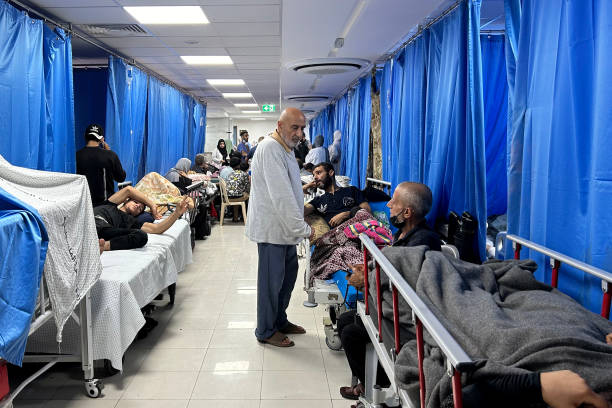Time is running out for people trapped inside Gaza’s largest hospital
Palestinians are running out of time, writes aid worker Hannah Bond. The only way to honour their bravery and resilience is to call for an immediate ceasefire


The last few days have seen intensifying attacks on and around al-Shifa Hospital in Gaza, the largest medical complex in the territory and a lifeline for families. The situation is utterly heartbreaking; all medical work has stopped, there is no electricity and no food or water coming in, children cannot be treated – and bodies cannot be buried. Gunfire and explosions have been heard inside the hospital complex, as Israel said its forces had entered the hospital as part of the IDF’s ground offensive against Hamas.
Hospitals must be safe havens, and we demand their protection and reiterate our calls for an immediate ceasefire to end the suffering of the people of Gaza. The right to seek medical assistance, especially in times of crisis, should never be denied. Decisive international action is needed now to secure an immediate humanitarian ceasefire to prevent further loss of life and preserve what’s left of the health care system in Gaza.
It is difficult to convey how catastrophic the humanitarian situation facing the 2.3 million Palestinians trapped in Gaza is right now. During a month of near-constant bombardment – in response to the Hamas attack inside Israel that killed 1,200 people and saw around 240 taken hostage – entire neighbourhoods have been reduced to rubble and more than 11,000 people have died [according to health officials in Hamas-run Gaza]. An estimated 1.5 million people have been displaced from their homes, with many forced to move multiple times.
Yet nowhere in the strip is safe: not the south of Gaza, where people were urged to flee, nor the UNRWA-run schools or hospital forecourts where thousands have taken shelter, all of which continue to be targeted by airstrikes.
Food supplies are running out. Much of the population is now surviving on just two pieces of bread a day, according to UNRWA, while supplies of essentials such as rice, pulses and vegetable oil have been almost entirely depleted. Water is scarce, with UNOCHA reporting a 92 per cent reduction in consumption, and many are forced to drink seawater or contaminated water, resulting in illnesses. At ActionAid, we’ve heard from mothers who are so dehydrated they are unable to produce breastmilk and are watching their newborn babies turn yellow from malnutrition in front of their eyes.
Since 7 October, just 569 trucks carrying desperately needed aid have entered the strip. Yet before that date, people relied on an average of 500 trucks every single day for aid and other supplies under the intense blockade by the Israeli government. And with roads heavily damaged by bombs, none of the limited aid received so far has been able to reach people sheltering in the north.
What’s more, not even one of the deliveries so far has contained fuel, which hospitals urgently require to keep babies in incubators and kidney disease patients on dialysis alive, and which bakeries need to turn flour supplies into bread. Without fuel, public and private transport is impossible, while surgeons are having to carry out C-sections and major surgeries using just the torchlight from their phones.
A series of communication blackouts, caused by internet and telephone lines being cut, have only added to the utter confusion and chaos. People have been left completely unable to communicate with their loved ones or call an ambulance to rescue casualties for hours at a time.
Amid so much horror, and with the world largely apathetic in the face of their plight, one can only imagine how hopeless Palestinians in Gaza must be feeling. And yet, against the odds, people have continued to demonstrate remarkable levels of resilience, unity and kindness.
Whether it’s the residents in the south opening their homes to displaced people from the north, sheltering upwards of a dozen people in each room, or people sharing their last pieces of bread with neighbours despite not knowing when they will eat again, Palestinians are supporting their community in any way they can.
Meanwhile, every day, doctors, nurses and surgeons who have lost members of their own families are putting aside their personal tragedies and making the risky journey to hospitals, where they try to treat an ever-growing number of patients with ever-dwindling medical supplies. In the streets, parents wait for up to six hours in queues to get food for their families, despite the danger from airstrikes, so as not to see their loved ones starve. As fuel supplies dwindled across Gaza, communities brought their last supplies to the hospitals with the hope of powering incubators on the brink of shutting down.
These daily acts of bravery and solidarity may not lead the news agenda, but that doesn’t mean they are not happening. The people of Gaza, amid the most horrific of circumstances, have been able to keep their shared humanity alive.
The best and only way we can honour their bravery and spirit right now is to double down on our efforts to call for an immediate ceasefire, and finally put an end to their nightmare.
Hannah Bond is co-director of Policy, Advocacy and Programmes at ActionAid UK
Join our commenting forum
Join thought-provoking conversations, follow other Independent readers and see their replies
Comments
Bookmark popover
Removed from bookmarks